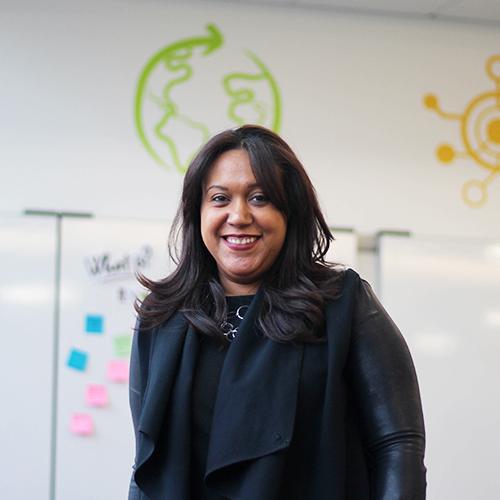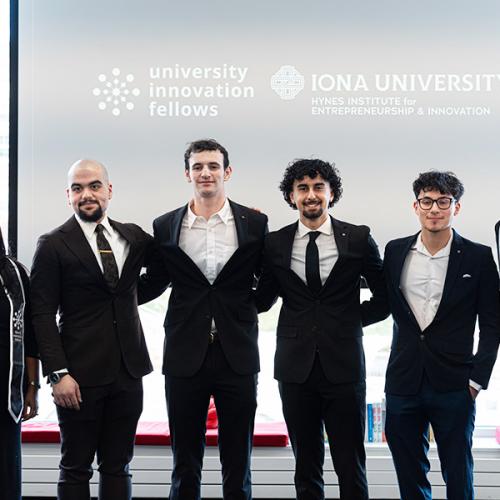Counseling Center Staff
The Counseling Center is staffed by licensed psychologists and mental health counselors specially trained to work with young adults.
The Center is also staffed by master’s- and doctoral-level Clinical Psychology and Mental Health Counseling externs, who provide counseling to students under the supervision of licensed staff.
Email: bstarkadler@iona.edu
Dr. Brielle Stark-Adler received her Ph.D. in counseling psychology from Fordham University. Since receiving her doctorate, she has specialized in collegiate and young adult mental health. Dr. Stark-Adler has clinical experience in a variety of treatment settings, including inpatient psychiatry, outpatient community mental health care, inpatient and outpatient substance abuse, and several college counseling centers. Her professional interests include identity development and individuation, religion and spirituality, romantic relationships and sexuality, and clinical training and supervision.
Email: lmcglynn@iona.edu
Lauren McGlynn graduated from New York University with a Master of Social Work degree and obtained additional licensure in clinical practice. She completed a clinical internship as a forensic social worker specializing in incarcerated adolescents and young adults. Lauren also spent six years working on inpatient psychiatry units at New York Presbyterian Hospital. Her primary focus was on the treatment of addiction and she has extensive experience working with substance use disorders and other addictive behaviors. She has received training in Cognitive Behavioral Therapy at the Beck Institute and is experienced in the use of Dialectical Behavior Therapy and Motivational Interviewing. Her professional interests include substance use disorders and other addictive behaviors including social media usage, relationships and sexual identity exploration, and issues related to trauma.
Email: esavage@iona.edu
Emma Savage (she/her) graduated from Fordham University with her M.S.Ed in Mental Health Counseling. She received her undergraduate degree from Syracuse University, studying English. Emma is also a registered yoga teacher through Yoga Alliance. She completed her clinical externship at Iona University Counseling Center, where she provided individual counseling and mindfulness and yoga-based outreach for emerging adults on campus. She also served as the Dolce Postgraduate Fellow at Iona, specializing in working with Neurodivergent emerging adults in both a counseling and classroom setting. She is the instructor for Gael Chat: Social Communication, which is an experiential learning environment in which students set and achieve goals to expand their skill sets related to social connectedness. Emma’s other clinical interests include intimate partner violence, family issues, and mindfulness. Emma utilizes a collaborative approach to create a warm and safe atmosphere for individuals to understand themselves better and make meaningful changes.
Stephanie(she/her) graduated from Columbia University with her M.A. and Ed.M. in Mental Health Counseling and received her undergraduate degree in Psychology from Washington University in St. Louis. She believes that genuine human connection is at the heart of meaningful therapeutic work and is passionate about creating a warm, culturally responsive space for students exploring identity, relationships, and the transitions of emerging adulthood. Her clinical interests include supporting individuals living with chronic health conditions, working with neurodivergent students, and exploring and processing emotions in therapy, particularly those rooted in early attachment experiences and relational dynamics. Stephanie practices from a trauma-informed lens that integrates Cognitive Behavioral Therapy (CBT), psychodynamic therapy, and Internal Family Systems (IFS). With curiosity and compassion, she looks forward to walking alongside her clients on a collaborative journey of self-discovery and healing.
Noah (he/him) received his bachelor’s degree in Human Development and Family Studies from the University of Connecticut. He joined the Iona University Counseling Center in January 2025 as the Care Coordinator, where he serves as a key connection between students and mental health resources. Noah has extensive experience supporting children, adolescents, and adults across a range of settings, including schools, community programs, and clinical environments. With a compassionate, person-centered approach, he provides care management, helps students navigate both on- and off-campus services, and ensures continuity of care tailored to each individual’s needs. Noah is dedicated to fostering a welcoming and supportive environment where students feel empowered to prioritize their mental health.
Alexa received her Psy.D. in school-community psychology from Hofstra University. She has trained in a variety of settings, including public high schools, Hofstra’s specialty emerging adults and autism clinics, and most recently completed her doctoral internship at Farmingdale State College Campus Mental Health Services. Throughout her training, Alexa has developed a specialization in working with neurodivergent adolescents and emerging adults. She is particularly interested in supporting individuals on the autism spectrum to find meaning in their diagnosis, strengthen their relationships and navigate emerging adulthood. Alexa is trained as a cognitive behavioral therapist, and works with an accepting, strengths-based approach. Her other professional interests include cognitive processing of trauma, alleviating loneliness, and neurodevelopmental disability diagnosis.
2025-2026 Externs
Li (he/him/his) is a third-year doctoral student at Hofstra's School-Community Psy.D. Program. He graduated from the University of Connecticut in 2021 with a Bachelor of Arts in Psychological Science. He received his M.A. in general psychology from Boston University in 2022. While completing his degree, he worked as a research assistant at the Transdiagnostic Research on Emotions, Neuroticism, and Dissemination-Unified Protocol Lab at BU's Center for Anxiety and Related Disorders. His research interests include the mechanism for transdiagnostic CBT for emotional disorders and developing and improving evidence-based treatments in a cross-cultural context. Li is also a member of Hofstra's Family Forensic Psychology clinic, where he helps to support families and child reunions. He strives to help young adults pursue and achieve their goals, becoming better versions of themselves at the Positive Psychology Institute for Emerging Adults.
Preethi (she/her/hers) is a third-year master’s student in the Mental Health Counseling program at Grace College and Theological Seminary. She holds a bachelor’s degree in Childhood Education with a double major in Creative Writing. Preethi is passionate about narrative therapy and believes that healing often begins when individuals learn to engage with and reauthor their personal stories. Grounded in a redemptive framework, her approach invites clients to explore meaning, identify inner strengths, and move forward with greater agency and self-compassion. She draws from a trauma-informed, strength-based lens that centers curiosity, cultural humility, and hope. Her clinical interests include identity formation, spiritual integration, and helping clients navigate life transitions. In alignment with her passion for storytelling and healing, she recently published a book exploring themes of mental health, trauma and faith-based resilience.
Nikola is a second-year master’s student in Mental Health Counseling and Spiritual Integration at Fordham University. He earned his bachelor’s degree in Psychology from the City College of New York and has contributed to projects on internet addiction and the reboot of the U.S. Air Force’s ADAPT program with NYU’s Family Translational Research Group. Nikola also brings clinical experience as a recovery coach at an eating disorder treatment center. Rooted in spiritually competent care, he is committed to a culturally sensitive therapeutic practice. His approach is primarily Psychoanalytic, with integrated elements of Acceptance and Commitment Therapy (ACT) and Cognitive Behavioral Therapy (CBT).


